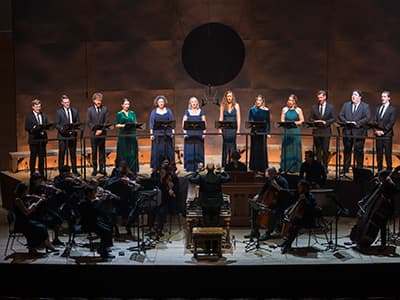 Griffin Theatre’s latest show Shabbat Dinner is a theatrical offering unlike any you’ve probably seen before. Not a conventional play per se, yet indisputably a performance, the audience gathers around the Stables’ famous wedge of a tiny transverse stage, now featuring a long table with seating for about a dozen. Each patron is handed a cup of wine or grape juice upon entry and are greeted by three hosts, Kirsty Marillier, Amy Hack, and the writer and key performer, Jessica Bellamy. These performers appear as themselves, and present to their audience an exploration of what, primarily from Bellamy’s perspective, is their personal experience of hosting a Shabbat dinner. They seek to explain their understanding of the act and meaning of creating a not-so-traditional Shabbat dinner as modern, relatively secular Gen-X/Millennial feminist vegan Jews, living in present-day Australia.
Griffin Theatre’s latest show Shabbat Dinner is a theatrical offering unlike any you’ve probably seen before. Not a conventional play per se, yet indisputably a performance, the audience gathers around the Stables’ famous wedge of a tiny transverse stage, now featuring a long table with seating for about a dozen. Each patron is handed a cup of wine or grape juice upon entry and are greeted by three hosts, Kirsty Marillier, Amy Hack, and the writer and key performer, Jessica Bellamy. These performers appear as themselves, and present to their audience an exploration of what, primarily from Bellamy’s perspective, is their personal experience of hosting a Shabbat dinner. They seek to explain their understanding of the act and meaning of creating a not-so-traditional Shabbat dinner as modern, relatively secular Gen-X/Millennial feminist vegan Jews, living in present-day Australia.
As Bellamy explains, an important part of their Jewish experience is a cultural appreciation of history and lineage, both in terms of a notional religious belief in having descended from Adam and Eve, and especially from an awareness of one’s personal family history. Over the course of the show they seek to explain how these historical and ritualistic markers of identity are an ongoing and intergenerational negotiation between tradition and adaptation, remembrance and interpretation. Bellamy frequently evokes the imagery of bones, and describes how one’s understanding of family history, scriptural meaning, or even a recipe for traditional dishes are often just iterative impressions, “readings of readings”. As much as we try to honour the past, these repetitions are ultimately based on imperfect memories, as seen through the lens of our own perspectives.
The production isn’t called Shabbat Dinner for nothing, and the table isn’t just for show. The hour-plus runtime is structured around the hosts inviting those viewing to participate in the three-course meal with them, and they actually mean it. For each course, a spontaneous new group comprised from members of the audience are invited to join them onstage, seated at the table as they dish out borscht, rice and vegetable stew, and finally honey cake with dates. For each serving prayers and blessings are read in Hebrew, and rituals are observed. Additional Challah bread and salt is handed out to the rest of the audience, and all join in with their cups of wine as the Kiddush blessing is recited.
Between the courses and while the patrons eat, these three women sing smatterings of Hebrew songs, as is a Shabbat dinner tradition, but mainly they tell stories. Some are Torah stories, like explaining that part of Shabbat lore involves greeting two angels into your house. Others are personal stories, such as how Bellamy’s grandmother came to Australia after escaping abject poverty and suffering in Europe.
Much of this has a delightfully feminist slant as well, discussing the inherent misogyny in the contested legends of Adam’s two rejected wives prior to Eve, or the tyranny of orthodox taboo rules around women’s bodies, clothes, and even chairs being deemed “unclean” and literally untouchable for a fortnight surrounding menstruation. It is pointed out that this is highly problematic for anyone trying to observe such a restriction if they have an irregular period, and that literalist interpretation even extends to the notion that virginal women cannot touch their husbands for seven days after producing hymen blood on their wedding nights.
They wryly discuss at length what it means to be a balabusta, the traditional conception of the idealised domestic Jewish woman, a wife and mother who keeps a clean house, grooms herself immaculately, provides tireless emotional support, bleaches their underwear of any menstrual blood, and preferably is pear-shaped. Indeed, discussion of what kind of fruits it is desirable for a Jewish girl’s body to emulate seem to loom large in Bellamy’s memories of her grandmother, along with the sobering stories of their family history as Odessa Jews under communism. Much hardship ensued when her great-grandfather was vindictively purged by Stalin after having previously found favour under Lenin.
This legacy of communism contributes to the notion of her family as kulinarischer, or “culinary Jews”. For these families it is rituals around food and recipes, rather than strict religious observance, that are the backbone of a sense of cultural continuity with their Judaism. They explain how such a status both informs and complicates the current generation’s wish to continue such traditions, yet adapt them to their modern lives. They note the dichotomy of adhering both to the ritual of a Shabbat dinner, yet also adhering to their convictions as vegans and ambivalence about being strictly kosher.
In the one bit of overt “acting” in this informal, apparently only semi-scripted production, Amy Hack takes on the persona of Bellamy’s grandmother, wearing the fur coat she was sure would be vitally useful when emigrating to Australia, while discussing her bemused chagrin over her vegan grandchildren’s insistence on only eating “sides”. Having grown up malnourished in Europe led her to a lifelong conviction that having meat on one’s plate was a sign of security, that things would be all right.
The figure of her grandmother is evocative and clearly relatable for many in the audience, and the story of having to clear out her residence after she died is particularly poignant for anyone who has gone through a similar process. It all comes back to food however, as her recipes were never written down, and thus Bellamy describes any efforts to recreate them as merely approximations from memory. Impressions. Readings of readings.
These are but some of the tales told, with a lot of fascinating ground being covered, especially for a relatively short show, punctuated by the act of actually seating and feeding part of the audience throughout. Juxtaposing stories both scriptural and personal, this is a unique and idiosyncratic history of Jewish women, by Jewish women. It is a meditation on how rituals and customs are reread and re-inscribed across the generations, showing that, even in a changing and secular world, traditions can have great meaning.
Griffin Theatre Company presents
Shabbat Dinner
by Jessica Bellamy
Director Anthony Skuse
Venue: SBW Stables Theatre | 10 Nimrod Street, Kings Cross NSW
Dates: 10 – 15 September 2018
Tickets: $35
Bookings: griffintheatre.com.au






.jpg)